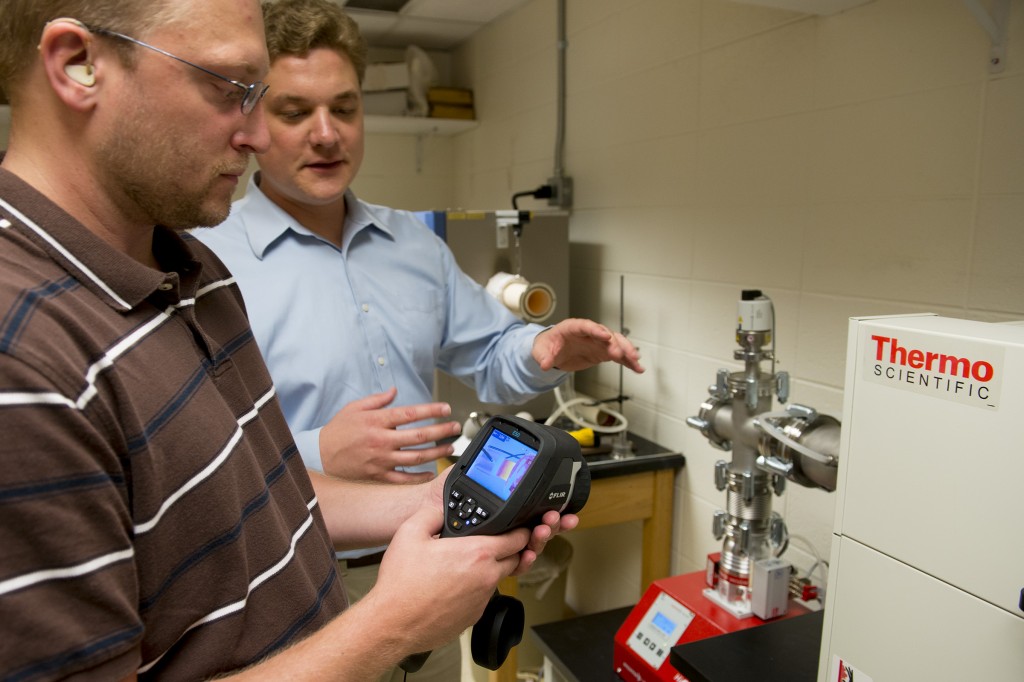Dr. Matt Jewell, an assistant professor in the Materials Science Center at the University of Wisconsin-Eau Claire, has been awarded a five-year $750,000 grant from the U.S. Department of Energy (DOE) to fund a faculty-student research project that seeks to improve superconductor technology in the medical and science fields. The grant will also provide funding for collaborative work with national laboratories and a research and development technology firm in River Falls, establishing new relationships between the university and the materials science industry.
The DOE Office of Science Early Career Research Program supports the development of individual research programs of scientists who are in the early stages of their careers and encourages research in program areas such as advanced scientific computing research, biological and environmental research, basic energy sciences, fusion energy sciences, high energy physics and nuclear physics.
“This is the first grant of its kind to be awarded on the UW-Eau Claire campus,” said Dr. Doug Dunham, director of the Materials Science Center. “The DOE is making a huge investment in Matt and in his project. It really shows the quality of research and faculty we have here.”
Jewell’s research project, which will be conducted collaboratively with students, focuses on the mechanical properties of high-temperature superconductors.
Superconductors are used to make the world’s largest magnets and are commonly divided into two classes, low-temperature (LTS) and high-temperature (HTS), based on the temperature to which the materials need to be cooled in order to become superconducting. LTS materials typically require liquid helium to operate effectively, whereas HTS materials can be cooled using liquid nitrogen to reach the superconducting state. Liquid nitrogen provides a much more cost-efficient and easily accessible alternative to liquid helium. HTS materials can also operate at much higher magnetic fields than LTS materials.
The problem Jewell’s research seeks to solve is to improve the mechanical performance of the conductor designs to increase stability and reliability as they are integrated into magnet systems.
“This project is important because it will help enable the creation of a brand new class of magnet,” Jewell said. “These large magnets are used in magnetic resonance imaging (MRI) and large-scale scientific devices. The use of reliable HTS superconductors can make these devices more accessible to medical centers and can allow scientific research facilities to perform well beyond their current limitations.”
Jewell said the grant allows for the development of cooperative relationships with other laboratories across the country to utilize complementary expertise. He also is working on creating a collaboration with Interfacial Solutions, a private contract research and development technology company in Rivers Falls that specializes in innovations in the materials science field.
“In addition to improving the superconductor itself, we have a need to improve how the magnet windings stick together, so we’re working with Interfacial Solutions to create new composite materials that will be able to withstand the cold temperature of liquid nitrogen,” Jewell said. “We are hoping to provide a new market for a local company and start a great new connection with them long term.”
Jewell said the students will benefit from the collaborative work with other research laboratories as well.
“Students will have the opportunity to interact with a broader scientific community and begin to understand the questions scientists are trying to answer,” Jewell said. “This extended project will teach them to focus on a goal and end point, which will serve them well in preparing for graduate school or the workforce. It may also open up the potential for internships or future careers at many of the facilities we are collaborating with.”
Jason Luhmann, a senior materials science major from Lake City, Minn., is one of the students who will be working on the HTS superconductor research project. He said he is looking forward to working on the cutting-edge project.
“We’ll be working on a project that will really make a difference and solve real problems in the world,” Luhmann said. “I consider myself a problem solver. I like to investigate things and that is what materials science is. This type of work is so rewarding.”
Luhmann has a background in mechanics and has worked with Jewell on research projects in the past. He said he feels very confident in his ability to contribute to this work.
“Being a part of a serious research project funded by the DOE is a huge opportunity for us as students, for the department and for the university,” Luhmann said. “It really gives validity to what the materials science program is doing here. I have a huge amount of respect for Matt and all he gives to his students. He really cares about our futures and how prepared we are when we leave here so we can be successful. I am very excited for the students who will come after me and I’m really happy to be here at the start.”
Luhmann also said he believes the opportunity for hands-on research and the relationships he has built with mentors as an undergraduate student is unique to UW-Eau Claire.
“I feel prepared to go into graduate school or into the workforce after completing my degree at UW-Eau Claire,” Luhmann said. “Working with Matt has been a great opportunity. He has definitely helped and mentored me in many ways. He recognizes individual skills and assigns work based on your strengths, but also provides you with opportunities to learn other areas and collaborate with other people. I wouldn’t have gotten this level of preparation at another university.”
For more information on the DOE grant or the research on the mechanical properties of high-temperature superconductors, contact Dr. Matt Jewell at jewellmc@uwec.edu or 715-836-3770.

Senior materials science major Jason Luhmann, left, works with Assistant Professor Matt Jewell on high-temperature superconductor research in UW-Eau Claire’s Materials Science Center. The U.S. Department of Energy’s Office of Science Early Career Research awarded Jewell a five-year, $750,000 grant in support of the research.
